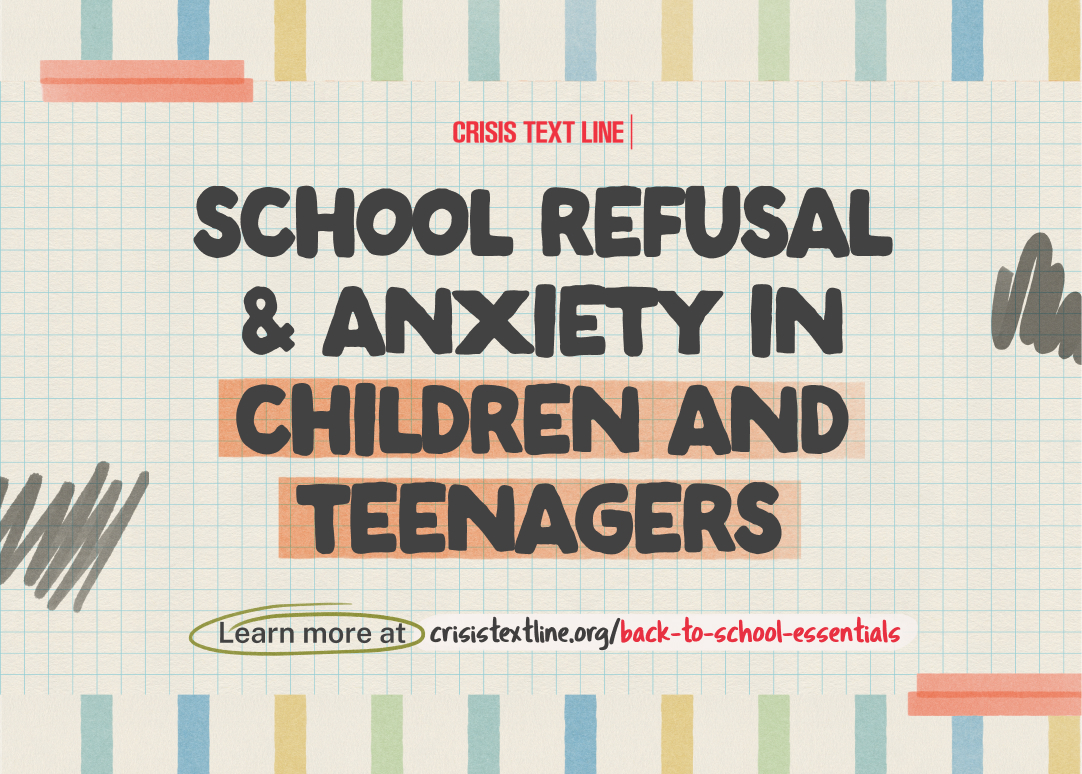School Refusal & Anxiety in Children and Teenagers

Dealing with school refusal can be challenging, but you’re not alone. Whether you’re a parent, caretaker or educator supporting a student through this, we’re here to help. Below, you will learn about school avoidance and how to navigate it. If you or someone you know is experiencing school refusal anxiety simply text CONNECT to 741741 to reach a live volunteer Crisis Counselor. We are here to support you through this.
What is school refusal or school avoidance?
School refusal is a term used to describe a child’s intense fear or anxiety about attending school. It can go beyond typical reluctance or occasional skipping of classes and can build up to refusing to attend school altogether. In some cases, students even make it all the way to school only to stay in the car and are never able to go inside. The reasons for this vary but is often associated with emotional distress, anxiety or other psychological issues.
“People from school just bully me.”
How is school refusal diagnosed?
There is no official diagnosis for school refusal. It is important to note that school refusal is not an emotional disorder, and is not in the DSM-5 (a reference book of mental health conditions for professionals). This doesn’t negate that it is a real issue, but gives clarity that it can be a very common symptom of anxiety and needs to be treated seriously. It can also be associated with other mental illnesses.
What are the signs of school refusal?
As mentioned, there is no true diagnosis, but there are signs that you should look out for. Has your child experienced a sudden or major life disruption? Have you noticed them changing in ways you can’t explain? Do they cry every morning when it’s time to start getting ready, or right before you drop them off? There can be many reasons they don’t feel comfortable going to school, including:
- A new family member
- Loss of a family member, friend or pet
- New school
- Puberty
- Insecurities
- Grades
- Bullying
- Depression
- Anxiety
- Social isolation
“I’ve been having panic attacks.”
How to manage when your child is refusing to go to school
It is great that you’re recognizing this is an issue and are taking the active steps to help your student succeed. Easing a child’s school anxiety is no easy feat, and should be handled with care and patience.
Here are some steps to help your child overcome the fear of attending school:
Talk with your child about the reasons why they don’t want to go to school
Engaging in an open and empathetic conversation with your child about why they don’t want to go to school is crucial. Start by creating a safe and nonjudgmental environment where they feel comfortable expressing their feelings and concerns. Here, at Crisis Text Line, we believe that leading with empathy is the best place to start when it comes to understanding someone.
Validate and actively listen
Validate your child’s feelings, and acknowledge that you recognize their difficulties. When they share their feelings, ensure you’re listening. You want to ensure that your child or student feels seen, heard and validated by you. Remember that it is likely that they do want to participate in school, but their anxieties around school aren’t making it easy. Learn more about active listening on our loneliness blog.
Don’t force your child to go to school
This can be contentious as school staff and therapists may recommend this immediately. It’s important to remember that this isn’t an active choice your student is making. True feelings of anxiety should be treated as any other serious issue. There may be a trigger in the school environment that is upsetting your child.
Take baby steps
As stated earlier, it is important to not rush into a solution. Take it day-by-day with your child and your support system at their school. You know your child best. Be sure to not overwhelm them, and to move at a pace that works and makes sense for them.
Build relationships with school staff
Communicating with school staff will be important so that your child does not fall behind on schoolwork or any delay with graduation . Check in with your child’s educational support team, guidance counselors, teachers, and any other supportive educators. Your child may still be willing to complete schoolwork, just in a different setting. Try getting assignments and important deadlines so that you’re aware of what the student will need to work on. It can help to make their days a bit easier in any way you can while they work through these confusing and difficult feelings.
Never stop ideating solutions
This list is not exhaustive. Every child is unique, and you know your child best. Continue to brainstorm new ways to support your child during this tough time and never give up hope in finding the right solution.
We understand that this can be overwhelming to deal with. We’re here for you and your child, 24/7. Text CONNECT to 741741 at any time.
“Every day is so stressful.”
What is truancy?
Truancy is when students are intentionally missing out on school, whether that be by absence or by being continuously late. Many schools also enforce truancy policies by holding parents responsible for their children’s failure to go to school. Truancy and school refusal are often confused but the main difference is whether or not the parents have knowledge of their students attending, whereas in truancy they do not.
Are there truancy consequences for parents?
There may or may not be. This is entirely dependent on your state and school district. In some cases, parents have faced fines and other legal consequences. Be sure to do research in your area and to reach out to your child’s school and maintain a consistent line of communication with them to avoid any negative consequences.
We understand that this may be a difficult time for you and your student. Rest assured that you are never alone. Whether you’re an adult or a student navigating school refusal, we’re here for you. All you have to do is text CONNECT to 741471 if you ever want to vent.
Related pages you might find helpful:

